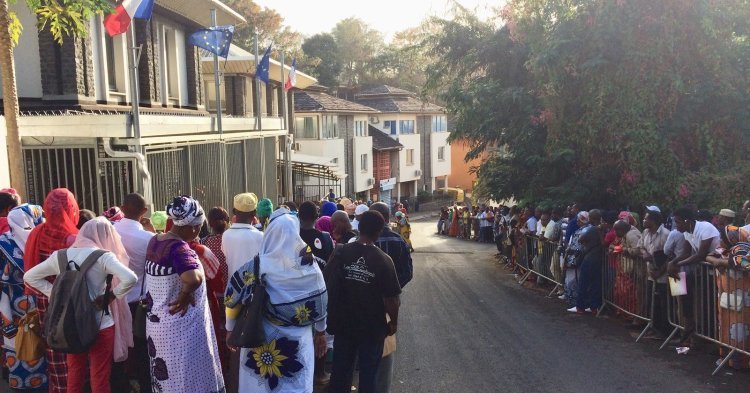Malek is 30 years old, holds a Master degree in English and linguistics and is now facing challenges he did not expect when he decided to seek asylum in Mayotte in 2019. Him and his two roommates will have to leave their room by the end of the month. As a consequence of the lock-down linked to the Covid-19 pandemic, they have not been able to pay their rent, and the landlord appears to have run out of patience. The floor of the tiny room in Mamoudzou, the capital of Mayotte, is covered in painted tiles. Blankets and pillows lie on the floor which will be used as three improvised beds for the night. A small cupboard and a tatty sofa have been left behind by previous tenants that came to seek asylum in Mayotte, a French overseas department like Malek. The young Yemenite is trying to keep his head up, but sometimes he is simply overwhelmed by the impact of the lock-down. “I feel like I am counting the remaining days of my life”, he says at the start of our video call in the beginning of May.
Currently, 1670 cases of Covid-19 have been confirmed on the island. The lock-down regulations issued by the French government, have confined the inhabitants of overseas territories to their homes. For asylum seekers in Mayotte, the latter often consist of no more than a single room they share with others, or minuscule huts made of tin.
Mayotte: a place of increased asylum applications
Mayotte, an island located within the Comoros archipelago between Madagascar and Mozambique, became an overseas department of France in 2011 and an outermost region of the EU in 2014.
Due to its geographical location Mayotte is increasingly receiving applications for asylum from the Comoros, but also the Democratic Republic of Congo (DRC), Burundi, Rwanda as well as Syria, Yemen and Cameroon. In 2018, a total of 809 asylum applications were registered on the island (Rapport d’activité OFPRA 2018, Rapport d’activité Solidarité Mayotte 2018). Most of the applicants are not aware of the precarious situation of asylum seekers in Mayotte, and the risk of becoming stranded on the island. “I believed I would have the same rights as asylum seekers in other parts of the EU”, explains Malek, who had scrutinised the web before embarking on the journey. What he lacked information about, was the huge discrepancy between mainland France and Mayotte when it comes to the enforcement of asylum seekers’ rights.
A part of the EU where asylum seekers’ rights are disregarded
Malek’s journey from Yemen to Mayotte lasted almost two months and cost a few thousand dollars. Due to restrictive visa regulations for Yemenites, after taking several flights, he had no other option than to go by boat from Madagascar to the Comoros. “These 26 hours were the most dangerous situation I have ever faced in my life”, he describes the trip on a tiny sailing boat with 20 people aboard, all hoping for a future in safety.
On arrival, the asylum seekers were on their own. Malek knew that Solidarité Mayotte, an NGO based in Mamoudzou, was key in organising support for asylum seekers on the island. Having written down their contact details, he approached their office. Solidarité Mayotte offers help regarding bureaucratic procedures and provides a little financial support to asylum seekers. They also host accommodation facilities, although they are insufficient for the number of people arriving. “I basically helped myself”, reports Malek, who initially sought shelter in a mosque, where he stayed for the first 15 days.
In theory, the asylum legislation in Mayotte and mainland France is the same. In France, registered asylum seekers have the right to accommodation, financial support, health care, and can apply for a work permit after 6 months. In practise, asylum seekers in Mayotte are systematically being denied these rights: accomodation is not provided by authorities, and renting a room is often impossible without official documents. Work permits are virtually inaccessible, and the financial support system does not exist on the French island. Solidarité Mayotte has already denounced this very precarious situation in their first report of activity from 2008. Nothing has changed since then (Report of France Terre d’Asile 2019).
Obtaining documents - a cumbersome process
Pierre, a political refugee from Burundi, who arrived in Mayotte in 2017, also sought shelter in a mosque before he found another place to stay. Already having spent a few years in Mayotte, he states: “In the beginning, you really need to find your way through here alone, and ask your conationals for help.” ‘Never give up’ became his mantra during that time.
Not only were Malek and Pierre denied support, the bureaucratic process was also rendered more difficult than on the continent. It took almost a year for Malek to get a first hearing with OFPRA, the French Office for the Protection of Refugees and Stateless Persons. OFPRA is responsible for all asylum applications submitted at the departmental administration in France, both mainland and overseas territories. However, in Mayotte, OFPRA does not have a permanent office. Therefore, Malek had to wait for the OFPRA delegation to travel to Mayotte for their fact finding mission.
“I ask the French government to help the people in Mayotte and to improve the application process, so that people don’t have to wait so long to get their papers”, insists Pierre. Indeed, the entire procedure requires long waiting times often including repeated queuing in front of the ‘préfecture’, the departmental institution handling registrations. Appointments can be made online, but include only a date, and not a specific hour - which makes early travelling and queuing necessary to ensure being heard. Additionally, since handing in documents online is impossible one might need to go through this procedure several times if something was missing. On top of that, due to infrastructural problems such as power-cuts, last-minute cancellations of long-awaited hearings with the National Court of Asylum (CNDA) are not uncommon. These hearings happen via video call, since the institution does not have a permanent presence in Mayotte either.
Bridging the time: Of patience and agency
For Malek, these procedures meant 11 months of uncertainties, during which he was not allowed to work. Obtaining a work permit is impossible during the first six months of a case is being treated by OFPRA - and is in general a lengthy process. The absence of a meaningful occupation is what Malek describes as a “slow death”. Therefore, he started to volunteer. Aware of the importance and lack of emotional and practical support for asylum seekers, Malek is now helping others arriving in Mayotte. As a translator, he accompanies people to the hospital or to bureaucratic procedures and helps wherever he can.
On the one hand, Mayotte is lacking qualified personnel for its deficient public health care sector and overcrowded public schools. For instance, France’s spending per student in Mayotte reach only ⅔ of what the State is spending on a student on the mainland. On the other hand, immigrants often bring the needed academic qualifications but are not allowed to make use of them. Instead, they are forced to turn towards the informal sector and become vulnerable to exploitation, generating their income as street vendors, household helpers or workers on construction sites. “At home I was an academic, while in Mayotte I was selling onions”, reveals Pierre, who has paradoxically often been accused by customers of having fled his country to take advantage of Mayotte’s wealth.
The social environment of Mayotte is undeniably far from welcoming. Malek experienced a few verbally offensive encounters with Mayotte’s inhabitants, but is generally convinced that “Mahorians are good”. Pierre’s experience has been different: his request for asylum has been accepted and he found a job in Mayotte. He nevertheless suffers from racism, and plans to leave the island: “Some Mahorians think that we have no right to live here.” Mayotte has the highest unemployment rate in the EU, while low salaries combined with high living costs are putting additional pressure on the inhabitants. These struggles are one of the reasons for Mahorians’ partly negative reaction to immigrants. As if the administrative and social adversities had not been enough, “in March 2020, chaos arrived”, affirms Malek.
Raising problems owing to the Covid-19 shut-down
Indeed, France’s strict confinement rules in reaction to the Covid-19 pandemic have hit the most vulnerable the hardest. 40% of Mayotte’s population live in tin huts, where access to sanitary infrastructure is not guaranteed, 30% of all houses lack running water.
For asylum seekers the situation is particularly delicate. President Macron’s strict confinement measures deprive people of the opportunity to generate a day-by-day income, which makes respecting confinement rules very difficult. Or as Malek puts it: “Outside we get the virus, inside we get the virus called hunger. The difference between the two is that Covid kills mostly people who are at the age of 55-60 years, but hunger and poverty do not differentiate between ages. However, it does not affect politicians or wealthy people, so it is being systematically overlooked.” Pierre comments on French authorities’ incapacity: “It’s an injustice! The government knows about our existence from the moment we ask for papers. But some groups of people have just been forgotten.” Asylum seekers have indeed been overlooked during public distributions of food. Police presence is not lacking on the island. Breaking confinement rules therefore means taking the risk of being fined. Malek observes that: “most people are respecting the confinement rules, but others don’t care anymore. They cannot be staying home with cuffed hands waiting for an ambiguous destiny.”
Pierre, just like Malek, took the decision to help. With the help of friends and relatives abroad, he initiated an international network to raise funds, in order to be able to buy and distribute food to people in need. “Those people had lost their hope, but the relief action has given it back to them. Now they can live again, thanks to the help of people they do not even know. It seems like a miracle for them.” But they remain dependent on the help of Pierre and his network, at least for the duration of the confinement.
This relief action has reached many migrants at the very last minute, but the underlying problems stay the same. As President Macron is slowly releasing confinement measures on the mainland (and a week later, also Mayotte), Covid-19 has exacerbated existing inequalities even more.
“We haven’t come to Mayotte to enjoy ourselves. We left because we were facing many problems in our home countries. We left our old lives behind to save our lives”, explains Pierre. He will continue the distribution of food until the situation stabilises. Malek, also, continues his volunteer work as a translator, while waiting for a positive decision from OFPRA and his family to join him. “The internet connection in the villages in Yemen is so bad, I can’t even do video calls to see my wife and daughter”, he remarks. His major hope is to finally settle down and work: “It doesn’t matter if it will be in Mayotte, La Réunion, or continental Europe. All I want is to live in peace.”
Shortly before having to leave his room, Malek has luckily found another temporary accommodation. It is no more than a room in a basement, but at least it is affordable and provides a roof over his head - a gleam of hope in difficult times.
Listen to Malek on the difficulties related to the lock-down here.





1. On 19 June 2020 at 22:56, by Hamed Replying to: From person in need to hero indeed: When Mayotte’s asylum seekers become veritable change makers
Replying to: From person in need to hero indeed: When Mayotte’s asylum seekers become veritable change makers
De belles paroles, merci à tous pour ce que vous avez fait pour refléter l’image réelle de notre situation actuelle de réfugiés dans une province européenne, en particulier un territoire français. Mayotte, qui semble ne pas faire partie de l’Union européenne, que ce soit dans le secteur gouvernemental, privé ou institutionnel et dans les infrastructures de l’île.
Cet article ne décrit qu’une partie de nos souffrances, mais il résume l’histoire de nos vies en général. Quant à moi, je suis un réfugié yéménite dans cette île, qui souffre de diabète, et ce n’est rien de plus que ce qui a été vécu. Je rêve de vivre en tant qu’être humain indépendamment de mon appartenance ethnique. Honnêtement, je n’ai pas trouvé de maison pour moi dans ma vie passée, je suis venu en Europe à la recherche d’une vie idéale, sûre et stable, et pour pratiquer ma vie scientifique et pratique et respecter les lois qui font de moi un être humain.
J’appelle toutes les délégations non gouvernementales, des droits de l’homme, humanitaires et internationales à prêter attention à notre mauvaise situation.
Merci beaucoup encore une fois
Follow the comments: |
|
